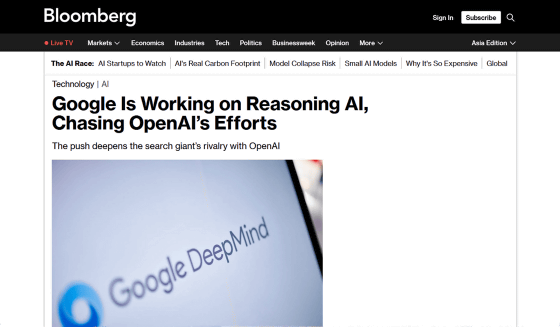Google DeepMind and biotech company BioNTech are each developing 'AI lab assistants'

It has been reported that Google's AI research division,
BioNTech Highlights AI Capabilities and R&D Use Cases at Inaugural AI Day | InstaDeep - Decision-Making AI For The Enterprise
https://www.instadeep.com/2024/10/biontech-highlights-ai-capabilities-and-rd-use-cases-at-inaugural-ai-day/
DeepMind and BioNTech build AI lab assistants for scientific research
https://www.ft.com/content/64b1bb33-095e-4cc5-a911-50df76fa3d1d
Google DeepMind has been developing AI in scientific research for some time, announcing projects such as ' AlphaProteo ,' which designs proteins that bind effectively to target proteins, and ' FunSearch ,' an AI system that outputs new solutions to mathematical science problems.
The Financial Times reported that Google DeepMind CEO Demis Hassabis is leading the company's efforts to develop 'dedicated AI models that act as research assistants.' At a Nobel Foundation event, Hassabis claimed that biology is undergoing a revolution as a result of AI software. 'We are working on developing large-scale scientific language models that act as research assistants, and maybe even help predict the outcomes of experiments,' Hassabis said.
Hassabis said that over the next few years, the tools Google DeepMind is building will be able to propose and design experiments based on a given hypothesis, and then predict, based on a probability, whether the proposed experiment will succeed or fail.

Google DeepMind is not the only company developing AI specialized in scientific fields. BioNTech, a biotechnology company also known for developing a new coronavirus vaccine, has
BioNTech outlined its AI approach ( PDF file) at its 'AI Day' event on October 1, 2024. In it, BioNTech unveiled 'Laila,' an AI agent based on Meta's large-scale language model, Llama 3.1 .
Laila is an AI agent specialized in biology, and there are three models with different parameters: 8B, 70B, and 405B. Laila can collaborate with human scientists to develop hypotheses, plan experiments, and call on specialized tools to analyze the results.

The live demonstration showed how Laila can automate routine scientific tasks in experimental biology, such as analyzing and segmenting DNA sequences, visualizing experimental results, etc. They also demonstrated how to connect Laila to laboratory devices to monitor the experiments and tasks being performed by the robot, as well as detect mechanical failures.
'We don't see a fully automated AI future coming anytime soon. We see AI agents like Laila as productivity accelerators, freeing up scientists and engineers to spend their limited time on the things that really matter,' InstaDeep CEO Karim Begir told the Financial Times.
In addition, foreign media outlet Bloomberg reported that several teams at Google are developing AI inference software.
Google Is Working on Reasoning AI, Chasing OpenAI's Efforts - Bloomberg
https://www.bloomberg.com/news/articles/2024-10-02/google-is-working-on-reasoning-ai-chasing-openai-s-efforts

Since OpenAI released the OpenAI o1 AI model with complex reasoning capabilities in September, some at Google DeepMind have expressed concern that the company is falling behind. However, since Google has already released its own AI products, there are no concerns like when ChatGPT was first released.
Bloomberg points out that Google and OpenAI are competing for dominance in the AI field, and Google is taking measures such as integrating its research labs to launch Google DeepMind and strengthening the relationship between researchers and product teams to regain the lead. On the other hand, Google is taking into consideration ethical issues, brand trust, and interests in large organizations when releasing AI products, and is moving more cautiously than OpenAI, Bloomberg said.
Related Posts:







